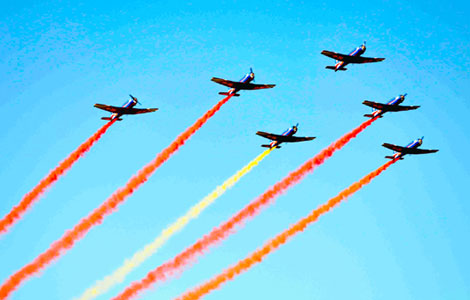China's military 'catching up' with US
Updated: 2011-08-26 08:27
By Tan Yingzi (China Daily)
|
|||||||||||
WASHINGTON - Major investments in a space program and aircraft and maritime technology by China have closed the gap with the United States military, said a new Pentagon report.
The report to Congress on Wednesday, which in the past has been a source of tension between the two nations, said China's military buildup will increase the risk of misunderstandings and miscalculations between the two. The annual report addressed the current and future course of military development of the People's Liberation Army (PLA), China's security and military strategy and US-China military ties.
It predicts that by 2020, the PLA will become a "modern, regional-focused military", and claimed that the Chinese mainland is focusing its military buildup on Taiwan, according to Bloomberg.
The report also predicts that Beijing will likely build multiple aircraft carriers with support ships over the next decade.
Xinhua news agency said in a commentary on Thursday that, for many in China, it is weird that the Pentagon, whose expenditure reached nearly $700 billion and accounted for over 40 percent of the world's total in 2010, routinely points its finger at China, whose military only spends a small fraction of what the Pentagon consumes every year.
Xinhua said it is "baffling" for the report to claim that the Chinese military poses a growing threat to regional stability.
This well exemplified the saying that "one man may steal a horse while another may not look over a hedge", according to Xinhua.
China has all along stuck to a self-defensive military policy, and hasn't dispatched a single combat soldier overseas in the past two decades, Xinhua said, adding that it is in China's fundamental interests to maintain peace and security.
US Deputy Assistant Secretary of Defense for East Asia Michael Schiffer said at a news conference that China would continue to develop the aircraft carrier it bought from Ukraine in 1998.
Aside from issuing warnings to Congress, the report praised China's new role in the international community and its growing involvement in international peacekeeping efforts, counter-piracy operations, humanitarian assistance and disaster relief, and the evacuation of Chinese citizens from overseas trouble spots.
But the Pentagon is highly concerned about China's rapid military buildup.
"The pace and scope of China's sustained military investment have allowed China to pursue capabilities we believe are potentially destabilizing to regional military balances," Schiffer said.
Therefore, strengthening military ties with China is a "critical part of our strategy to shape China's choices as we seek to capitalize on opportunities for cooperation with mitigating risks", the report said.
The report said that the lack of transparency about China's military development is one of the challenges for US-China military relations.
According to Fan Jishe, a researcher from the Institute of American Studies at the Chinese Academy of Social Sciences who closely follows the report every year, the positive comments about Chinese military development have increased, compared with the previous several years.
However, he doesn't see any positive role that the annual report has played, except stirring protests from the Chinese side.
Douglas Paal, of the Carnegie Endowment for International Peace, said that the greatest challenge between the two countries is "deep strategic mistrust".
"Chinese and American military officers have different understandings of the meaning of common terms and actions, and greater exchanges may help keep these from becoming the basis for wrong conclusions and decisions in a time of crisis," he said.
The report's focus on Taiwan is merely an excuse that the United States used to continue to sell arms to Taiwan, but it is actually not solid enough to support the action, according to Fan.
"After all, the Taiwan question should no longer be considered as a military issue, but more of a political one," he told China Daily.
Qin Zhongwei contributed to this story.
Hot Topics
Anti-Gay, Giant Panda, Subway, High Speed Train, Coal Mine, High Temperature, Rainstorm, Sino-US, Oil Spill, Zhu Min
Editor's Picks

|

|

|

|

|

|





